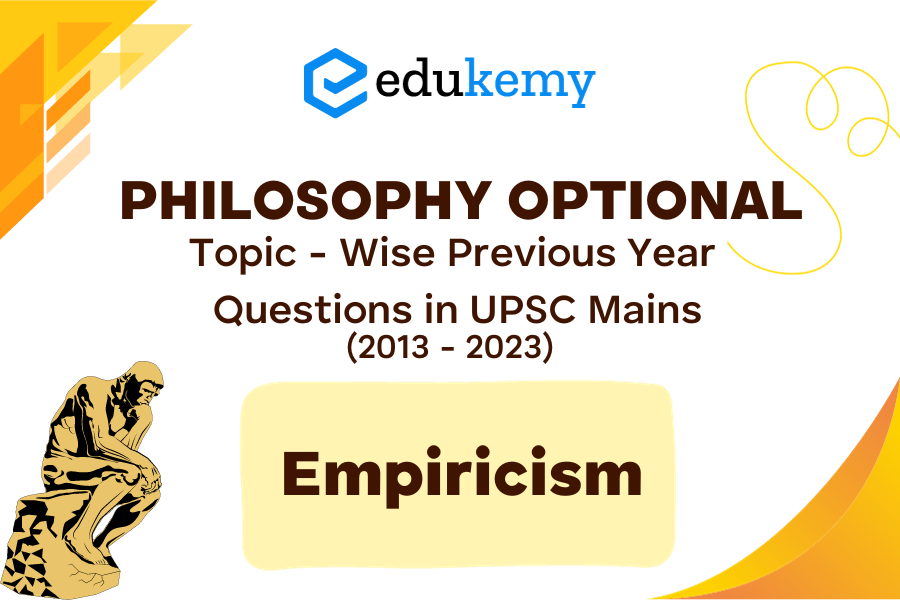
Exploring the intricate realm of philosophy within the competitive realm of the UPSC Mains examination can be a formidable but intellectually rewarding journey. One of the most intriguing optional topics for this exam is Empiricism, a philosophical school of thought that has left an indelible mark on the way we understand the world. In this blog, we embark on a philosophical odyssey through the lens of UPSC Mains by delving into a decade’s worth of previous year questions on Empiricism, from 2013 to 2023. These questions serve as a window into the intricate web of ideas, principles, and arguments that have shaped the course of human thought for centuries. By unraveling the complexities of Empiricism as presented in these questions, we aim to equip aspiring civil servants and philosophy enthusiasts with a deeper understanding of this philosophical tradition and its relevance in contemporary society.
Through this exploration, we will not only decode the specific questions asked in the UPSC Mains but also uncover the broader themes and philosophies that underlie them. This journey into the heart of Empiricism will not only enhance your knowledge but also hone your critical thinking and analytical skills, essential attributes for excelling in the UPSC examination. So, let’s embark on this intellectual adventure, dissecting the questions and diving into the depths of Empiricism to gain a profound understanding of this philosophical tradition and its significance in the context of the UPSC Mains examination.
Contents
Empiricism Philosophy – Previous Year Questions (UPSC CSE Mains History Optional)
1. Show how Hume’s analysis experience leaves no ground for beliefin any permanent reality either physical or mental. (2017/10)
2. How does Locke draw a distinction between primary and secondary qualities ? Does he also draw a distinction between the Idea of primary qualities and primary qualities as well as the Idea of secondary qualities and secondary qualities ? Discuss (2017/20)
3. What is the logical necessity for Locke to introduce the concept of secondary qualities? Give reasons for your answer(2016/10).
4. Critically examine Hume’s views on the relation of cause and effect.(2016/15) qualities ?
5. Evaluate critically Hume’s criticism of theory of causation.(2014/15)
6. Give a critical account of Hume’s theory of self. (2013/12 ½)
7. Critically examine John Locke’s categorization of primary and secondary qualities and explain the problem it posed for later empiricist.(2012/15)
8. If ‘to be is to be perceived’ then how does Berkeley explain the permanence of things ? (2012/15)
9. Was Hume skeptic ? If not then what is his contribution to philosophy ? (2012/15)
10. John Locke said that ‘ No man’s knowledge can go beyond his experience’. Discuss critically the implications of this statement.(2012/12)
11. What, according to Empiricists is the concept of Substance? Discuss.(2011/20)
12. What metaphysical implications can be derived from Berkeley’s statement “Esse Est Percipi”. (2010/30)
13. Does Hume deny the possibility of knowledge? Discuss. (2010/15)
14. “To be is to be perceived”. Discuss. (2009/20)
15. Compare the view of Leibnitz and Hume on the concept of substance. (2009/30)
16. Hume and Kant on metaphysics. Short notes. (2008/20)
17. State and discuss Locke’s views on Substance. (2007/60)
18. Explain the theory of knowledge according to Locke. Short Notes.(2006/20)
19. Discuss Hume’s Ecepticism. (2006/60)
20. Hume’s views on Induction. Short Notes. (2004/20)
21. To be is to be perceived. Short Notes. (2003/20)
22. Hume’s Phenomenalism. Short Notes. (2002/20)
FAQs on Empiricism
Q: What is the Philosophy of Empiricism?
A: The philosophy of empiricism is a school of thought that asserts that knowledge primarily comes from sensory experience. It emphasizes the importance of observation and experimentation in forming our understanding of the world. Empiricists argue that innate ideas are not a significant source of knowledge. Key figures associated with empiricism include John Locke, George Berkeley, and David Hume.
Q: What Are the Core Tenets of Empiricism Theory?
A: Empiricism theory is characterized by several core principles, including the belief that all knowledge is derived from sensory experience, the rejection of innate ideas, and the idea that the mind is a blank slate (tabula rasa) at birth. It also highlights the importance of empirical observation, induction, and the scientific method in gaining knowledge about the world.
Q; Who Was David Hume, and What Were His Contributions to Empiricism?
A: David Hume was an influential Scottish philosopher in the 18th century and a prominent figure in the empiricist tradition. He made significant contributions to epistemology and philosophy of mind by examining causation, skepticism, and the limitations of human understanding. Hume’s “A Treatise of Human Nature” is considered a cornerstone work in the empiricist canon.
Q: What Is British Empiricism in Philosophy?
A: British empiricism, also known as the empirical tradition, refers to the empiricist philosophy that emerged in Britain during the 17th and 18th centuries. This philosophical movement was primarily represented by British philosophers like John Locke, George Berkeley, and David Hume. It focused on the idea that knowledge is grounded in experience and emphasized the rejection of a priori knowledge.
Q: How Does British Empiricism Influence Modern Philosophy and Science?
A: British empiricism has left a lasting impact on modern philosophy and science. It laid the foundation for empirically-based approaches in various fields, including the natural sciences, psychology, and the scientific method. The empiricist emphasis on evidence, observation, and the rejection of a priori assumptions continues to shape the way we approach knowledge and understanding in contemporary academia and research.
In case you still have your doubts, contact us on 9811333901.
For UPSC Prelims Resources, Click here
For Daily Updates and Study Material:
Join our Telegram Channel – Edukemy for IAS
- 1. Learn through Videos – here
- 2. Be Exam Ready by Practicing Daily MCQs – here
- 3. Daily Newsletter – Get all your Current Affairs Covered – here
- 4. Mains Answer Writing Practice – here

